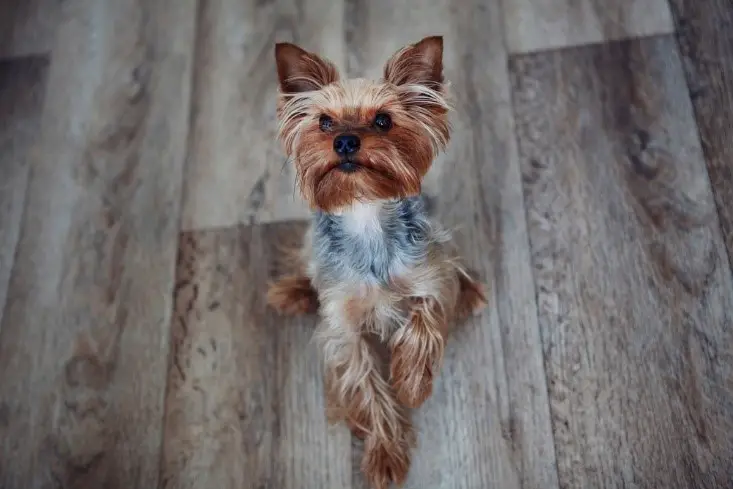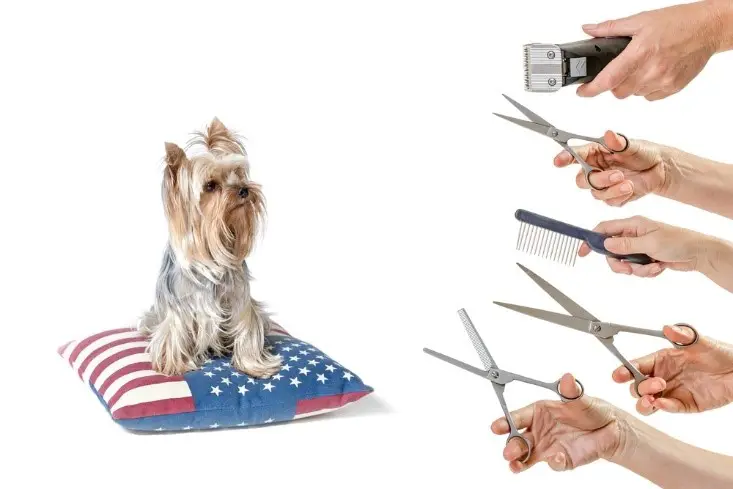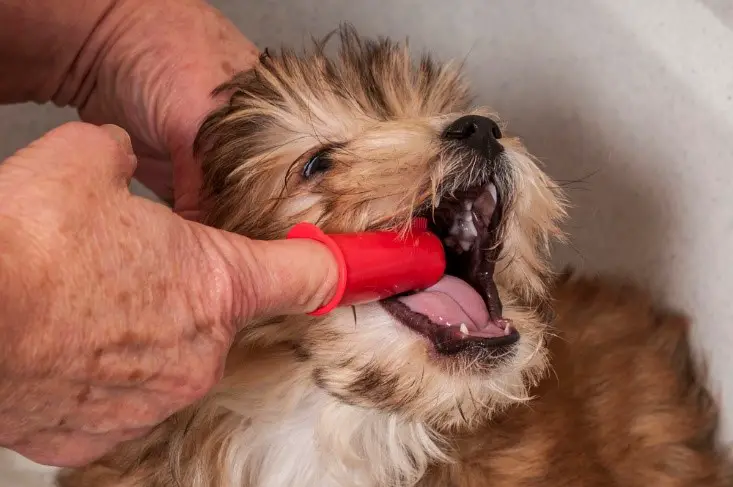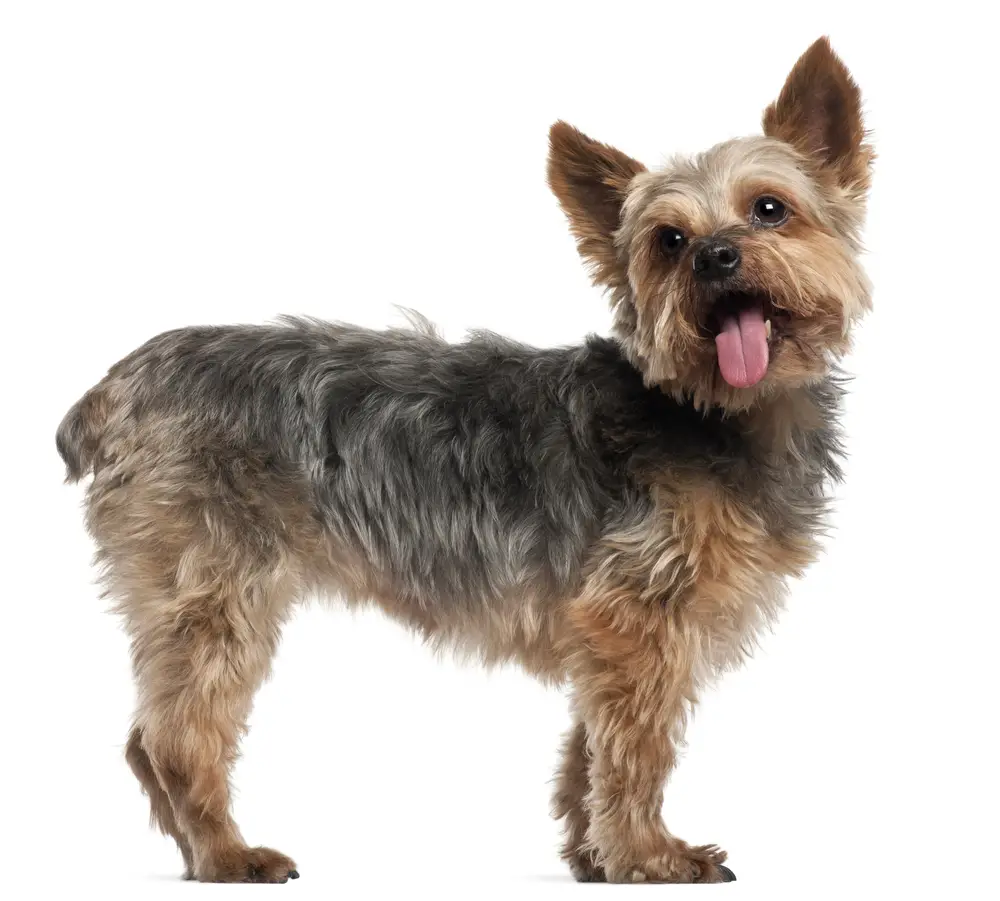Yorkie Care
Yorkie Care
How to Take Care of a Yorkie: Your Comprehensive Yorkie Care Guide
You’ve brought your Yorkie home and you’re ready to give him the best life possible. Want to know where to get started and how to take care of a Yorkie? This comprehensive Yorkie care guide covers everything you need to know from your Yorkie’s exercise and medical needs to grooming, diet, and behavior.
Basic Yorkie Care Information & Supplies
 Yorkshire Terriers are known for their intelligence, independence, and high level of activity — very different personality traits than most toy breeds. Yorkies are usually just 4 to 7 pounds when fully grown and can live up to 16 years. While adaptable to many living situations with a high level of intelligence, Yorkie care isn’t for the feint of heart.
Yorkshire Terriers are known for their intelligence, independence, and high level of activity — very different personality traits than most toy breeds. Yorkies are usually just 4 to 7 pounds when fully grown and can live up to 16 years. While adaptable to many living situations with a high level of intelligence, Yorkie care isn’t for the feint of heart.
Yorkies require a lot of attention, especially when it comes to grooming, socialization, medical needs, and potential behavioral issues like barking and separation anxiety.
To get your Yorkie comfortable in his new home, your first step should be setting up a defined area in your home for your Yorkie. Identify an area where your Yorkie will be safe and comfortable when you aren’t nearby that he can claim as his own. This will be important as your Yorkie gets older to control territorial behavior and ease separation anxiety.
Crating isn’t recommended for Yorkies. Instead, they do better with an indoor dog playpen or a gated area. The IRIS 4-panel pet playpen is a good choice because it’s affordable, comes in a range of colors, and offers just enough space to give your Yorkie room to explore while confining potential accidents.
Once you have the playpen set up, you can line it with puppy training pads then add creature comforts.
Your Yorkie will need a comfortable dog bed. An orthopedic dog bed is recommended to give your Yorkie adequate joint support as they are prone to joint conditions. A thick bed is also a good choice because it helps your small Yorkie stay warm. The Deep Dish Cuddler dog bed by Best Friends of Sheri offers a good mix of warmth, orthopedic support, and affordability.
Next comes the most fun part of how to care for a Yorkie: picking out a selection of toys. It’s a good idea to give your Yorkie a mix of age-appropriate toys that include teethers, chew toys, and treat release toys. A treat release toy like the IQ treat ball helps your Yorkie stay occupied and helps relieve separation anxiety. Teething toys like the Comtim puppy chewer help ease discomfort as your pup’s primary teeth come in while massaging the gums to remove tartar.
Diet & Snacks for Your Yorkie
 Once your Yorkie is set up with toys, a bed, and a space of their own, it’s time for the next stage of Yorkie care: proper nutrition. Your Yorkie needs a well-balanced diet that’s mindful of potential allergens and health issues your pup may have. Yorkshire Terriers do best on a dry kibble that helps maintain healthy teeth and gums. Canned food should be avoided except as an occasional treat because it doesn’t support oral health and may cause diarrhea. Choose a kibble formulated specifically for toy breeds like Nutro Wholesome Essentials. Remember that your Yorkie’s nutritional needs are different when they’re still a puppy. For the first 12 months, choose a puppy kibble like Merrick Lil’ Plates puppy food to support healthy growth.
Once your Yorkie is set up with toys, a bed, and a space of their own, it’s time for the next stage of Yorkie care: proper nutrition. Your Yorkie needs a well-balanced diet that’s mindful of potential allergens and health issues your pup may have. Yorkshire Terriers do best on a dry kibble that helps maintain healthy teeth and gums. Canned food should be avoided except as an occasional treat because it doesn’t support oral health and may cause diarrhea. Choose a kibble formulated specifically for toy breeds like Nutro Wholesome Essentials. Remember that your Yorkie’s nutritional needs are different when they’re still a puppy. For the first 12 months, choose a puppy kibble like Merrick Lil’ Plates puppy food to support healthy growth.
Yorkie Feeding Schedule
For the first 3 months of your Yorkie’s life, give them free-feed meals without limiting their intake while they are being weaned. Continue until your Yorkie reaches at least 2.5 pounds which is large enough for structured meals. After your Yorkie pup is 1 year old, he will do best with 3 small meals over the course of the day. You can continue this structured meal plan for the rest of your Yorkie’s life although it can be adjusted based on your Yorkie’s preferences. Some dogs simply prefer a larger meal at the beginning of the day and a smaller meal before bed.
How Much to Feed Your Yorkie
To determine the appropriate amount of kibble to give your Yorkie each day, make sure you have an accurate weight for your Yorkshire Terrier. You can use a kitchen scale or the scale at your vet’s office. Check the kibble manufacturer’s recommended serving size based on weight. This will be the amount to give your Yorkie per day which should be divided into three meals. Use a dry measuring cup to measure out your Yorkie’s meals. As a general rule, Yorkie puppies between 2 and 4 pounds need 1/3 to 1/2 cup of kibble every day. Small adults will eat the same amount but larger Yorkie adults up to 8 pounds may need up to 2/3 cup of food per day.
Yorkie Care Tips for Feeding Time
 Here are some general tips to keep in mind when feeding your Yorkie. — Don’t be concerned if your Yorkie only takes small nibbles of their food. Yorkshire Terriers tend to eat small meals so it may not seem that they are getting enough at meal time. — Your Yorkie’s primary diet should come from dry kibble. Wet food doesn’t stimulate your pup’s teeth and gums and can increase the risk of Yorkie dental problems. — You can make kibble more appealing by briefly soaking it in warm water. This can be helpful if your Yorkie is missing teeth. You can also drizzle a spoonful of low-sodium broth over the kibble.
Here are some general tips to keep in mind when feeding your Yorkie. — Don’t be concerned if your Yorkie only takes small nibbles of their food. Yorkshire Terriers tend to eat small meals so it may not seem that they are getting enough at meal time. — Your Yorkie’s primary diet should come from dry kibble. Wet food doesn’t stimulate your pup’s teeth and gums and can increase the risk of Yorkie dental problems. — You can make kibble more appealing by briefly soaking it in warm water. This can be helpful if your Yorkie is missing teeth. You can also drizzle a spoonful of low-sodium broth over the kibble.
Yorkie Snacking Guidelines
It’s perfectly fine for your Yorkie to have several dry treats throughout the day, especially between mealtimes. In fact, it’s a good idea to give your Yorkie a snack between meals as it reduces the risk they will vomit stomach bile. This is a fairly common problem with toy breeds that go too long without eating. When choosing snacks, make sure you avoid giving your Yorkie rawhide. Rawhide can be dangerous to any dog but it’s especially dangerous for Yorkies and other toy breeds because it’s a choking hazard and can cause intestinal or stomach blockages. Don’t be afraid to give your Yorkie fruits and vegetables as a snack. Many Yorkshire Terriers enjoy treats like baby carrots, sweet potato, green beans, banana, and strawberry. In the summer, you can give your dog frozen fruit or, for an extra bit of sweetness, mix the fruit with yogurt and freeze in ice cube trays.
Yorkie Grooming Guidelines
 If you want to know how to care for a Yorkshire Terrier, you will absolutely need to know how to handle grooming, especially if your Yorkie has a long hair coat. Yorkies are considered very high maintenance when it comes to grooming and you should expect to spend some time grooming your dog every day. Here’s a Yorkie care guide for grooming.
If you want to know how to care for a Yorkshire Terrier, you will absolutely need to know how to handle grooming, especially if your Yorkie has a long hair coat. Yorkies are considered very high maintenance when it comes to grooming and you should expect to spend some time grooming your dog every day. Here’s a Yorkie care guide for grooming.
Bathing
Your Yorkie should have a gentle bath about every 3 weeks to remove natural oils and dirt. Use a high-quality dog shampoo with a pH between 6.5 and 7.5 that will nourish your Yorkie’s hair and help remove tangles without irritating their skin. Earthbath All Natural Pet Shampoo is a good choice. During the bath, make sure you clean away tiny bits of feces that may cling to fine hairs and areas that may be splashed with urine. A good strategy is cleaning your Yorkie’s entire body before addressing trouble areas like the underbelly and rear end. Between baths, you can use hypoallergenic dog grooming wipes around the legs, underbelly, rear, and genitals.
Brushing
 All Yorkies need to be brushed regularly, even Yorkies with a short coat. Brushing helps detangle, remove debris, and clear away dead hair that gets stuck in the coat and covered in body oil. Regular brushing also distributes oils to give your Yorkie’s coat a healthy sheen. If your Yorkie has a moderately long coat, brushing every day is recommended. Use a professional pin brush that easily detangles your Yorkie’s hair. If your Yorkie has a short coat, you can use a soft bristle brush instead. You can finish up brushing with a leave-in spritz but this is optional. It may be worthwhile if you want your Yorkie to smell fresh, your Yorkie has a long coat, or your Yorkie tends to get dirty easily. If you do use a spritz, choose a product that conditions and moisturizes your Yorkie’s hair like the Nootie Daily Pet Conditioning Spritz.
All Yorkies need to be brushed regularly, even Yorkies with a short coat. Brushing helps detangle, remove debris, and clear away dead hair that gets stuck in the coat and covered in body oil. Regular brushing also distributes oils to give your Yorkie’s coat a healthy sheen. If your Yorkie has a moderately long coat, brushing every day is recommended. Use a professional pin brush that easily detangles your Yorkie’s hair. If your Yorkie has a short coat, you can use a soft bristle brush instead. You can finish up brushing with a leave-in spritz but this is optional. It may be worthwhile if you want your Yorkie to smell fresh, your Yorkie has a long coat, or your Yorkie tends to get dirty easily. If you do use a spritz, choose a product that conditions and moisturizes your Yorkie’s hair like the Nootie Daily Pet Conditioning Spritz.
Nails
Finally, you should have your Yorkshire Terrier’s nails trimmed about every 6 weeks. You can trim your dog’s nails at home if you’re comfortable but most Yorkie owners have it done at the groomer’s. You can have your pup’s nails trimmed at the same time they get their coat trimmed.
Activity & Exercise for Your Yorkie
Yorkshire Terriers are quite active dogs despite their small size. Your Yorkie needs exercise every day to protect their heart, lower the risk of serious health conditions, stimulate their appetite, and prevent significant weight gain. Your Yorkie may seem to prefer staying indoors or inactive but they still need exercise outdoors and fresh air. Try to take your Yorkie on a walk at least twice a day for 15-20 minutes. Outdoor play in an enclosed area can also give your Yorkie the activity he needs.
One of the most important things to remember when taking your Yorkie out on walks is to use a vest harness, not a collar. Yorkies are at risk of a collapsed trachea which can happen when the pup yanks on a leash while wearing a collar against their trachea. A soft padded harness like the no-pull Pupteck harness can prevent an injury to your dog’s trachea.
Training & Behavioral Problems
While your Yorkie is young, it’s a good idea to consider training strategies that will help you overcome common behavioral problems as your dog gets older. At the very least, you should begin housebreaking your Yorkie once they’re old enough to control their bowel and bldder muscles. This usually happens around 8 weeks. As your Yorkie gets older, they can be trained to communicate when they need to go outside by ringing bells or sitting in front of the door. You may want to sign up for dog training classes which teach you how to interact positively with your Yorkie to achieve obedience goals and overcome troublesome behavior. If you would rather train your dog yourself, try clicker training which uses positive reinforcement when your Yorkie demonstrates desireable actions like sitting. This affordable starter training set includes doorbells, a training clicker, a treat pouch, and other tools to help you train your Yorkie at home. It’s also important to understand certain types of behavior you can expect from your Yorkie — both as a puppy and as an adult — and the best methods for overcoming behavioral issues.
Separation Anxiety
 Separation anxiety is more than your pet just missing you; it causes an extreme emotional response that may include destructive behavior. Any dog can experience separation anxiety but Yorkies are more prone to it given they are bred to remain close by their humans. There are several strategies that can help your Yorkie overcome separation anxiety: — Give your Yorkie a calming space that makes them feel comfortable and secure. — Keep separation anxiety aids in your Yorkie’s space. These include interactive squeaky toys and treat release toys. — Leave a radio or TV on to provide pleasant background noise. — Make cues less significant. Your Yorkie will pick up on the fact that putting on your shoes or holding your car keys means you’re leaving. This can cause premature anxiety. Make these cues normal by putting on your shoes and walking around the house for awhile without leaving.
Separation anxiety is more than your pet just missing you; it causes an extreme emotional response that may include destructive behavior. Any dog can experience separation anxiety but Yorkies are more prone to it given they are bred to remain close by their humans. There are several strategies that can help your Yorkie overcome separation anxiety: — Give your Yorkie a calming space that makes them feel comfortable and secure. — Keep separation anxiety aids in your Yorkie’s space. These include interactive squeaky toys and treat release toys. — Leave a radio or TV on to provide pleasant background noise. — Make cues less significant. Your Yorkie will pick up on the fact that putting on your shoes or holding your car keys means you’re leaving. This can cause premature anxiety. Make these cues normal by putting on your shoes and walking around the house for awhile without leaving.
Mouthing
Most young dogs under two use mouthing and biting to relieve teething pain and explore the world. Of course, this can develop into a biting problem if it isn’t addressed. The best way to combat mouthing and biting is through bite inhibition. When your puppy tries to bite, say “ouch” very loudly. Give your dog something appropriate to chew like a toy. Always reward them when they react correctly by avoiding biting or taking the toy.
Barking
Excessive barking is a common trait of a Yorkie. Your pup may bark at what he sees out the window or when someone comes to the door. Barking may be a sign of separation anxiety if it happens when you leave. Your pup’s barking could be territorial which is the hardest to combat once it develops. If your Yorkie barks excessively, it’s important to determine why. Territorial barking may be solved by moving your dog’s independent space as far from the yard and front door as possible. You can also give your dog positive reinforcement to bark just once or twice at a stranger by rewarding them when they use more appropriate behavior. Nuisance barking caused by stress or boredom may be corrected with more frequent playtime and walks.
Caring for Your Yorkie’s Health
One of the most important elements of Yorkie care is protecting your Yorkie’s health. Yorkshire Terriers are prone to several health conditions. Some can be managed while others may be prevented. Here’s how to take care of a Yorkie and reduce the risk of serious disease or disability.
Schedule Regular Vet Visits
Be prepared for annual vet checkups and the occasional sick visit to your Yorkie’s vet. Once your Yorkie is an adult, he should have a wellness checkup every year. After the age of 8 or 9, plan for a checkup every 6 months. During the wellness exam, your vet will check for signs of health problems as early detection can give your Yorkie the best prognosis. Your Yorkie will also receive booster shots to guard against contagious disease like rabies and kennel cough.
Vaccines & Preventative Care
Want to know how to care for a Yorkshire Terrier and reduce their risk of serious disease or infection? Make sure you stay on top of preventative measures such as vaccinations and protection against fleas, ticks, and heartworm. Heartworm is spread through mosquitoes. Your vet will need to prescribe heartworm prevention medication that should be taken year round. Small breeds like Yorkies tend to tolerate Advantage Multi heartworm prevention best. To protect against ticks and fleas, an oral medication is your best bet. These medications need to be given every 30 days to repel fleas and ticks. Veterinary Parasitology reports that oral flea medication is 99.9% effective but topical flea treatments are only 88.4% effective. Frontline Plus is a good choice for protecting your Yorie. Frontline contains medication that travels through your Yorkie’s blood to kill fleas and ticks when they bite.
Take Care of Your Yorkie’s Teeth
 Brushing your dog’s teeth may not be fun but it’s an essential part of how to care for a Yorkie given their high risk of dental problems. Yorkies are prone to issues like double teeth, gum disease, and early tooth loss with makes Yorkie teeth care essential. It’s a good idea to have your Yorkie’s teeth cleaned at their annual wellness check. You should also clean your Yorkie’s teeth at home every day — or as often as they let you. Use dog tooth brushes like Ortz dog toothbrushes and a dog-safe toothpaste like Virbac C.E.T. Enzymatic Toothpaste to gently remove tartar and preserve your Yorkie’s oral health.
Brushing your dog’s teeth may not be fun but it’s an essential part of how to care for a Yorkie given their high risk of dental problems. Yorkies are prone to issues like double teeth, gum disease, and early tooth loss with makes Yorkie teeth care essential. It’s a good idea to have your Yorkie’s teeth cleaned at their annual wellness check. You should also clean your Yorkie’s teeth at home every day — or as often as they let you. Use dog tooth brushes like Ortz dog toothbrushes and a dog-safe toothpaste like Virbac C.E.T. Enzymatic Toothpaste to gently remove tartar and preserve your Yorkie’s oral health.
Watch for Signs of Health Problems
You should also discuss your Yorkie’s risk for certain health conditions with your vet. Yorkies are prone to several diseases and conditions, many of which can be managed with veterinary care. Your Yorkie may be at risk for:
- Hypoglycemia
- Collapsed trachea due to genetic weakness or pulling too hard on a collar
- Luxating patella or kneecap dislocation
- Progressive retinal atrophy (PRA)
- Cataracts
- Retinal dysplasia
- Legg-Perthes disease which affects the hip joint
- Skin allergies

